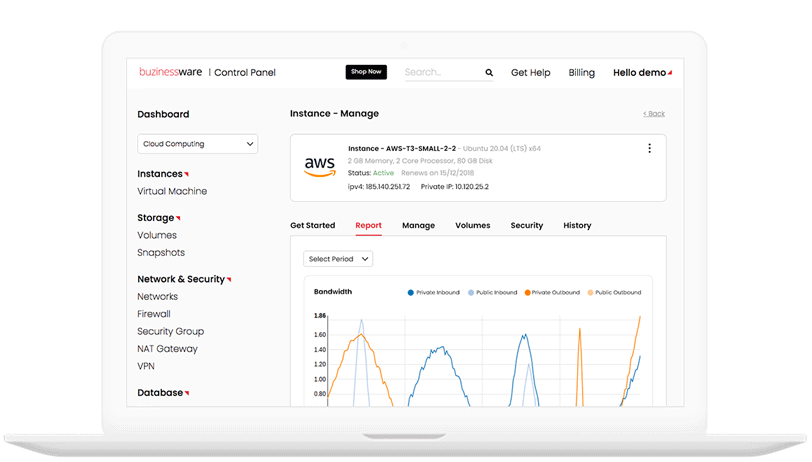Future-proof your business with tailored Infrastructure-as-a-Service solutions
Buy Affordable Managed Cloud Servers in Saudi Arabia from Middle East Data Centers
Power up your website without exceeding your budget with our cheap unbeatable value Cloud Hosting plans, delivering lightning-fast deployment and 24/7 priority support in your regional time zone
Local
SPEED
LOCAL SUPPORT
Search Engines
DATA Compliance


Plans & Pricing
Select provider

Loading...
Compare
Server Management Levels
![]() INITIAL
INITIAL
SETUP
![]() 24/7 PRIORITY
24/7 PRIORITY
SUPPORT
![]() REALTIME
REALTIME
MONITORING
![]() SECURITY
SECURITY
MANAGEMENT
![]() PERFORMANCE
PERFORMANCE
REPORTING
![]() OPERATIONS
OPERATIONS
MANAGEMENT
Managed
Included Free
Managed Pro
Available at checkoutSetup
Support
Moderate :- Server is up and some services are down
Minimal :- Server and services are up. Other requests
Moderate: 4 hours
Minimal: 8 hours
Moderate: 2 hours
Minimal: 4 hours
Tickets
Live Chat
Phone
Tickets
Live Chat
Phone
Monitoring
Management
Security
(Subscription of Acronis Cyber protect Cloud Plan required)
Reporting
Rock solid computing features that ensure reliability at scale
99.99% Uptime SLA
If we fail to deliver, we’ll credit you for downtime
KVM
Enterprise-grade KVM hypervisors improve network performance and security
Monitoring
Monitor server performance and receive alerts when problems arise in your infrastructure
Cloud Firewalls
Setup network-based policies. Tag the servers and appropriate rules are applied immediately
Snapshots
As an add-on, you can take a virtual copy of your data and have a version to revert back to anytime
Enterprise SSDs
Every server comes with high performing and high availability persistent SSD block storage
IPv4/IPv6
Configure your network simply and securely, including up-to-date range of IPv4/IPv6 addresses
Private Networking
Enables servers to communicate within the same data center at no additional bandwidth costs
Looking for managed multi-cloud servers across cloud provider of your choice?
Looking for more than infrastructure?
Managed Cloud Solutions
Delivered as a fully managed experience, our cloud hosting solutions ensure best-in-class architecture, configurations & software by default on cloud provider of choice backed by 24/7 priority support
Website/CMS
Cloud Hosting
Get all-inclusive, managed cloud web hosting
Ecommerce
Cloud Hosting
Ecommerce, your way. Managed cloud infrastructure, our way.
Mobile/Web Apps
Cloud Hosting
Get all-inclusive, managed web application hosting on cloud
Legacy/Desktop Apps Cloud Migration
Application modernization solution to enable web access
Cloud Services
Accelerate your digital transformation journey and add more value with Buzinessware's full-cycle cloud services
Cloud Infrastructure
Consulting
Application Development
& Modernization
Cloud Migration
& Deployment
24/7 Multi-Cloud
Management
Become our Partner
More than 1,000+ resellers, integrators, administrators, consultants & affiliates leverage our 20+ years of expertise, deep portfolio and preferential pricing to deliver high-value solutions to their customers
why people prefer managed cloud server Saudi Arabia (KSA)
There are several reasons why people might prefer managed cloud servers in Saudi Arabia:
- Expertise: Managed cloud servers in Saudi Arabia are typically provided by experienced and knowledgeable cloud service providers who have the expertise and resources to manage the servers efficiently. This means that customers can benefit from the expertise of professionals without having to worry about the technical details themselves.
- Convenience: Managed cloud servers provide convenience to customers who do not want to worry about server maintenance, updates, and security. This allows them to focus on their core business operations while the cloud service provider takes care of the technical details.
- Convenience: Managed cloud servers provide convenience to customers who do not want to worry about server maintenance, updates, and security. This allows them to focus on their core business operations while the cloud service provider takes care of the technical details.
- Security: Managed cloud servers in Saudi Arabia are typically hosted in secure data centers that are equipped with the latest security measures and protocols. This provides customers with peace of mind knowing that their data is secure and protected from unauthorized access.
- Cost-effectiveness: Managed cloud servers in Saudi Arabia are often more cost-effective than traditional on-premises servers, as customers only pay for the resources they use. This eliminates the need for businesses to invest in expensive hardware and infrastructure, which can save them a lot of money in the long run.
Buzinessware Managed Cloud Server benefits
Buzinessware offers Managed Cloud Server solutions that come with several benefits for businesses, including:
- High Performance: Buzinessware's Managed Cloud Servers are optimized for performance, providing businesses with fast and reliable computing power. The servers are designed to handle high-traffic websites, applications, and databases, ensuring that businesses can operate seamlessly.
- Scalability: Buzinessware's Managed Cloud Servers are highly scalable, meaning that businesses can easily add or remove resources as needed. This flexibility ensures that businesses can quickly respond to changing market conditions and demands.
- Security: Buzinessware's Managed Cloud Servers come with robust security features, including firewalls, intrusion detection, and malware protection. These features help keep business data safe and prevent unauthorized access.
- 24/7 Support: Buzinessware provides round-the-clock support for its Managed Cloud Servers, ensuring that businesses can get assistance whenever they need it. The company's support team is highly skilled and experienced, helping businesses resolve any issues quickly.
- Cost-Effective: Buzinessware's Managed Cloud Servers are cost-effective, as businesses only pay for the resources they use. This means that businesses can save money by avoiding the upfront costs of purchasing and maintaining their own hardware.
- Reliability: Buzinessware's Managed Cloud Servers offer high levels of reliability, with uptime guarantees of up to 99.99%. This ensures that businesses can operate without downtime, reducing the risk of lost revenue and customer dissatisfaction.
Overall, Buzinessware's Managed Cloud Server solutions provide businesses with the performance, scalability, security, support, cost-effectiveness, and reliability they need to succeed in today's competitive environment.
Managed Cloud Server v/s unmanaged cloud server
Managed and unmanaged cloud servers refer to two different approaches to managing the infrastructure and services of a cloud server.
A managed cloud server is a server that is fully managed by a hosting provider or a third-party managed service provider (MSP). The provider takes care of all the administrative and maintenance tasks related to the server, such as setting up the server, configuring the operating system, installing updates, security patching, backups, monitoring, and troubleshooting. The customer usually has access to a control panel or dashboard to manage their applications and data, but the provider handles the underlying infrastructure.
On the other hand, an unmanaged cloud server is a server that is provided by a cloud hosting provider, but the customer is responsible for managing all aspects of the server, including the operating system, applications, security, and backups. The hosting provider typically provides a bare-bones server with no pre-installed software or management tools, and the customer must install and configure everything themselves.
The choice between a managed and unmanaged cloud server largely depends on the customer's technical expertise and resource availability. Managed cloud servers are generally more expensive, but they can save time and effort by offloading server management tasks to the provider. Unmanaged cloud servers are cheaper but require more technical skills and resources to manage.
In summary, a managed cloud server offers convenience, security, and peace of mind, while an unmanaged cloud server offers more control and flexibility but requires more technical expertise and effort to manage.
What is Cloud Server Hosting
Cloud server hosting is a type of web hosting service where a website or application is hosted on a virtual server that is accessed through the internet. Unlike traditional web hosting where a website or application is hosted on a physical server, cloud hosting allows for greater flexibility and scalability.
In cloud hosting, a website or application is hosted on a virtual server that is part of a larger network of servers located in multiple data centers around the world. This network of servers is managed by a cloud hosting provider, who is responsible for maintaining and managing the hardware and software infrastructure necessary to support the website or application.
One of the key advantages of cloud hosting is its ability to scale resources up or down depending on the needs of the website or application. This means that if a website experiences a sudden increase in traffic, the hosting provider can quickly allocate more resources to ensure that the website remains stable and available. Conversely, if traffic decreases, the hosting provider can reduce the amount of resources allocated, which can help reduce costs.
Another advantage of cloud hosting is its reliability and availability. Since a website or application is hosted on a virtual server that is part of a larger network of servers, if one server goes down, the website or application can be quickly migrated to another server in the network, minimizing downtime.
Overall, cloud server hosting offers businesses and individuals a highly scalable, flexible, and reliable web hosting solution that can help them manage and grow their online presence.
 Get Customized Solution
Get Customized Solution

